Social distancing is a matter of being altruistic

Written by: Patrick D. Randolph, Ph.D.
Date Updated: 3/30/2020
Health experts and government officials insist social distancing is necessary in the fight to slow the spread of coronavirus from potentially swamping the nation’s medical system and leading to more deaths. Because the symptoms of coronavirus will not affect everyone and may have less than severe effects for 80 percent of those infected, many are willingly staying at home, knowing their efforts may primarily benefit others, especially our parents, grandparents and those with chronic illnesses. Social distancing is an example of altruism, the willingness to suffer in the service of someone else.
While altruism has a role in social distancing, it also enhances our personal health, healing, and happiness. In a review of the Longitudinal Study of Aging, the Mayo Clinic found that those who volunteered regularly tended to live longer. The “helper’s high” has been tied to the release of endorphins, a pain-killing, feel-good chemical that also improves our ability to fight infections and manage disease.
The altruistic tend to report better overall health, happiness, well-being, and lower stress levels. Altruism seems to be most rewarding when the giving draws us closer to others. This strong feeling of human connection may promote our survival in a crisis by more effectively coordinating a community response, while boosting our personal health and wellness. That is powerful medicine, especially now.
In addition to the silent expression of kindness through social distancing, our community is reaching out in many ways. I’m told many local school teachers have traveled “caravan-style” through their school neighborhoods in a “mobile pep rally” to wave at their students.
Some dear friends were recently touched to find a roll of toilet paper left anonymously on their door step with a verse from the biblical book of Psalms that read, “Be still and know that I am God.” These lighthearted acts of compassion can ease the tension, bring a smile, and shine the light of perspective on life’s bigger picture.
American poet, essayist and philosopher Ralph Waldo Emerson, who incidentally lost his 19-year-old wife to respiratory illness, said, “The purpose of life is not to be happy. The purpose of life is to be useful, to be honorable, to be compassionate, to have it make a difference that you have lived and lived well.” Social distancing seems necessary to control COVID-19, but if we choose it as a virtue, rather than an obstacle to happiness, then seeds of health, joy and wholesomeness are planted for us all. May this hope inspire us to live well today, perhaps ironically, by being still.
Helpful hint: Frequent hand washing has been recommended.Pairing hand washing with an existing habit such as using the restroom and eating may strengthen it to become a new habit. To build altruism, consider using a favorite quote, chant, song or Bible verse as a 20-second hand washing timer.
Pat Randolph is a health psychologist, and CEO of WholesomePathway.com, a health improvement software company.